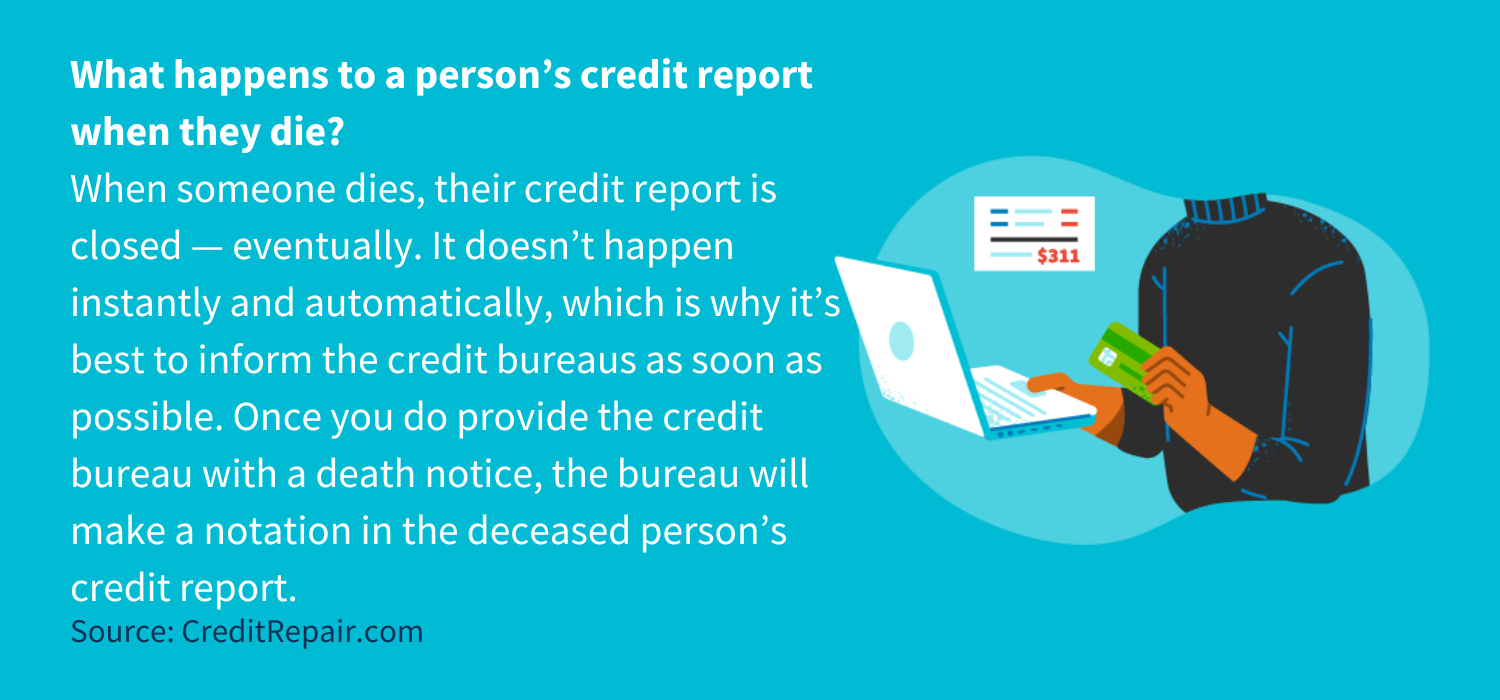

credit bureaus. The regrettable truth, however, is that a deceased individual's financial obligations and liabilities need to be resolved as quickly as they can be. Stopping working to do so can cause financial headaches for recipients and the estate of the deceased, with creditors trying to gather the departed individual's financial obligations and triggering you stress during a time when you don't want to be considering such matters. What follows are responses to some of the most common questions about what occurs to financial obligation when a member of the family dies and why you ought to report deaths to credit bureaus to avoid any credit issues.
What takes place to a person's credit report when they pass away?

When someone dies, their credit report is closed– eventually. It doesn't occur immediately and immediately, which is why it's best to inform the credit bureaus as soon as possible.
When you do offer the credit bureau with a death notification, the bureau will make a notation in the departed individual's credit report.
While this does not right away close their credit report, it reduces the possibility of the deceased's identity being stolen. Flagging that the individual is deceased will stop an identity burglar from fraudulently opening a new credit line in the deceased person's name.
After seven years of being flagged due to death and all accounts being settled, the credit report will be closed for great. It will then be erased completely by the credit bureaus and will no longer exist.
How do the credit bureaus discover a person's death?
There are a couple of different methods for the 3 credit bureaus (TransUnion ®, Experian ® and Equifax ® )to discover that somebody has actually passed away:
- By the departed person's loan providers. After a death, the estate's executor or a relative of the deceased notifies several lending institutions– for example, a charge card company or a car loan supplier that had been utilized by the deceased– to inform them of the death. When the loan provider updates the account keeping in mind the death, the death will get reported to several of the credit bureaus. Via the Social Security Administration (SSA). The SSA routinely notifies the 3 credit bureaus about deaths. To do that, of course, the SSA itself requires to have been informed about the death. This is frequently done by the funeral home. Furthermore, the departed individual would require to have been receiving Social Security advantages for the SSA to notify the credit bureaus.
- From the executor or a relative. Alerting a credit bureau directly that someone has passed away is the most proven method to make sure the credit bureaus upgrade their credit reports in a timely style. It's faster and more reputable than the other ways mentioned above.
How you report a death to the credit bureaus
To report a death to the credit bureaus, you must call among them and offer a death certificate. This can be done online or through the mail.
While you can alert all three credit bureaus, it's really just needed to notify among them; when one credit bureau is alerted, that bureau will notify the other 2. Here are the actions you need to require to report at death to the credit bureaus:
1. Make certain the Social Security Administration has upgraded its files
While funeral homes typically get the job done of reporting the death to the Social Security Administration, you might also want to get in touch with the SSA straight to make certain the information was sent properly. This can't be done online; you should call the SSA.
In addition to making sure the SSA reports the death to the credit bureaus, calling the SSA can provide you an opportunity to discuss receiving any death benefits (if eligible).
2. Get the death certificate
The credit bureau will require a death certificate as evidence that someone has actually died, so this action must be done as quickly as possible.
Depending on your state and locality, the process for obtaining a death certificate will vary. The document might be issued from a city clerk, records department or court house. Checking the site of or calling the Department of Health in the state where the individual died is a good location to begin.
3. Ask for a credit freeze from the credit bureaus
Contacting each credit bureau to request a credit freeze will flag the account and avoid brand-new lines of credit from being opened by identity burglars. It can be done online or over the phone.
If you choose to do it over the phone, it's a great concept to ask any questions you may have about the more formal action of notifying the credit bureau of the death.
Here's how to get in touch with each credit bureau online to request the credit freeze:
4. Send out in a copy of the death certificate to among the credit bureaus
As soon as you have actually gotten the death certificate, send out a copy to among the bureaus. Experian is the only one of the three credit bureaus that enables you to finish the procedure online rather of by means of the mail.
In addition to sending out the death certificate, consisting of the following details about the deceased:
- Legal name
- Social Security number
- Date of birth
- Date of death




